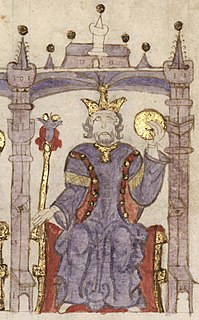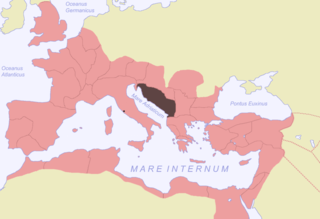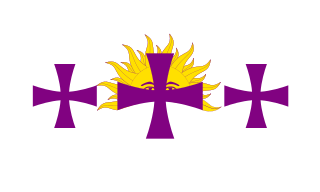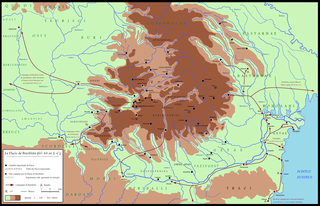Related Research Articles

Alfonso IV, called the Monk, was King of León from 925 and King of Galicia from 929, until he abdicated in 931.

The Illyrians were a group of Indo-European speaking peoples, who inhabited the western Balkan Peninsula in ancient times. They constituted one of the three main Paleo-Balkan populations, along with the Thracians and Greeks.
The Delmatae, alternatively Dalmatae during the Roman period, were a group of Illyrian tribes in Dalmatia, contemporary southern Croatia and western Bosnia and Herzegovina. The region of Dalmatia takes its name from the tribe.

Illyricum was a Roman province that existed from 27 BC to sometime during the reign of Vespasian. The province comprised Illyria/Dalmatia and Pannonia. Illyria included the area along the east coast of the Adriatic Sea and its inland mountains. With the creation of this province it came to be called Dalmatia. It was in the south, while Pannonia was in the north. Illyria/Dalmatia stretched from the River Drin to Istria (Croatia) and the River Sava in the north. The area roughly corresponded to modern northern Albania, Serbia, Kosovo, Slovenia, Montenegro, Bosnia and Herzegovina and coastal Croatia. Pannonia was the plain which lies to its north, from the mountains of Illyria/Dalmatia to the westward bend of the River Danube, and included modern Vojvodina, northern Croatia and western Hungary. As the province developed, Salona became its capital.

Béjar is a town and municipality of Spain located in the province of Salamanca, autonomous community of Castile and León. As of 2018, it had a population of 12,961. The historical development of the town has been linked to its once thriving textile manufacturing industry.

Hispanidad is a term alluding to the group of people, countries, and communities that share the Spanish language and Hispanic culture. The term can have various, different implications and meanings depending on country of origin, socio-political views, and cultural background.

Lagartera is a municipality of Spain located in the province of Toledo, Castilla–La Mancha. The municipality spans across a total area of 81.02 km2 and, as of 1 January 2020, it has a registered population of 1,354.

Adanero is a municipality of Spain located in the province of Ávila, Castile and León. The municipality has a total area of 31.42 km2 and, as of 1 January 2019, a registered population of 196, according to the INE.

Uclés is a municipality of Spain located in the province of Cuenca, Castilla–La Mancha. The municipality spans across a total area of 64.61 km2 and, as of 1 January 2020, it has a registered population of 212.

Cohors tertia Delmatarum equitata civium Romanorum pia fidelis, was a Roman auxiliary cohort mixed infantry and cavalry unit.

Teurisci was a Dacian tribe at the time of Ptolemy. They are considered originally Celts, a branch of the Celtic Taurisci (Noricum), who moved to Upper Tisza. However, the archaeology shows that Celts have been absorbed by Dacians, at some extent both creating a Celto-Dacian cultural horizon in the upper Tisza.

Potaissa was a castra in the Roman province of Dacia, located in today's Turda, Romania.
The National Monarchist Union was a Spanish political party, founded in April 1930 as successor to the Patriotic Union, the official party promoted by the dictatorship of Primo de Rivera. Its leadership comprised several minister of the regime as well as the son of the dictator. Featuring a Neo-Conservative matrix, the party included nonetheless an active group of representatives of the radical right and vouched for the installation of an Authoritarian monarchy.

Francisco Alía Miranda is a Spanish historian. He has focused on the study of 20th century Spanish history. He has also published works dealing with the methodology of history.
Julio Aróstegui Sánchez (1939–2013) was a Spanish historian. Professor at the Complutense University of Madrid (UCM), some of his research lines included the study of political violence in Modern Spanish history, Carlism, the Spanish Transition, the Spanish Civil War, the history of the workers' movement and collective memory. His scholar production also intertwined with the theoretical problems of history and the methodology of research.
The Sardiatae or Sardiates were an Illyrian tribe that lived in Dalmatia, in the Pliva valley around the area of Jajce and Šipovo, in present-day Bosnia and Herzegovina. They are mentioned by Pliny the Elder, who locates them in the conventus iuridicus of Salonae, and reports that they had 52 decuriae. They are also mentioned by Ptolemy, and in the Libri Coloniarum of the Gromatici Veteres along with the Tariotes.
Abu l-Qasim Ahmad b. Mu‘awiya b. Muhammad b. Hisam b. Mu‘awiya b. Hisam b. ‘Abd al-Rahman b. Mu‘awiya, known as Ibn al-Qitt, was an Umayyad Cordobese rebel and self-proclaimed Mahdi.
Sancho Jiménez, Sancho Jimeno o Sancho Ximeno, nicknamed 'Hunchback' by Christians and Abū-Barda’a by Muslims, was a militia leader in 12th-century Iberia. Captain of the militias of Ávila, he distinguished by his unrelentless attacks and plundering expeditions in Muslim-controlled territory.